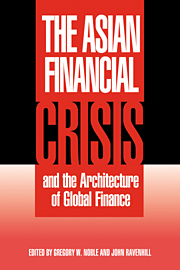Book contents
- Frontmatter
- Contents
- Abbreviations
- List of Figures
- List of Tables
- List of Contributors
- Preface
- 1 Causes and Consequences of the Asian Financial Crisis
- 2 Capital Flows and Crises
- 3 The Political Economy of the Asian Financial Crisis: Korea and Thailand Compared
- 4 The Good, the Bad and the Ugly? Korea, Taiwan and the Asian Financial Crisis
- 5 Indonesia: Reforming the Institutions of Financial Governance?
- 6 Political Impediments to Far-reaching Banking Reforms in Japan: Implications for Asia
- 7 Dangers and Opportunities: The Implications of the Asian Financial Crisis for China
- 8 The International Monetary Fund in the Wake of the Asian Crisis
- 9 Taming the Phoenix? Monetary Governance after the Crisis
- 10 The Vagaries of Debt: Indonesia and Korea
- 11 The New International Financial Architecture and its Limits
- Notes
- Bibliography
- Index
3 - The Political Economy of the Asian Financial Crisis: Korea and Thailand Compared
Published online by Cambridge University Press: 05 June 2012
- Frontmatter
- Contents
- Abbreviations
- List of Figures
- List of Tables
- List of Contributors
- Preface
- 1 Causes and Consequences of the Asian Financial Crisis
- 2 Capital Flows and Crises
- 3 The Political Economy of the Asian Financial Crisis: Korea and Thailand Compared
- 4 The Good, the Bad and the Ugly? Korea, Taiwan and the Asian Financial Crisis
- 5 Indonesia: Reforming the Institutions of Financial Governance?
- 6 Political Impediments to Far-reaching Banking Reforms in Japan: Implications for Asia
- 7 Dangers and Opportunities: The Implications of the Asian Financial Crisis for China
- 8 The International Monetary Fund in the Wake of the Asian Crisis
- 9 Taming the Phoenix? Monetary Governance after the Crisis
- 10 The Vagaries of Debt: Indonesia and Korea
- 11 The New International Financial Architecture and its Limits
- Notes
- Bibliography
- Index
Summary
Discussion of the causes of Asia's economic crisis has been dominated by a focus on economic, especially international economic, factors. To the extent that attention has been paid to the role of the domestic and the political, it has been in relatively broad terms, such as crony capitalism, weak leadership or autocratic government. Given the spread of the crisis across a range of geographically proximate countries in a relatively short time, emphasis on the role of international capital markets and contagion is certainly not misplaced. Nonetheless, it is at least incomplete and may in fact be misleading. Domestic political factors played an important role in the onset of financial crises in the region and in their initial management.
In particular, we are interested in showing how institutional arrangements constrained the ability of governments to respond to mounting economic policy problems and how this, in turn, contributed to rising uncertainty and ultimately panic among investors. In making this argument, we focus on two new democracies – Thailand and Korea – and the way in which they managed financial sector problems. In varying degrees, institutional arrangements in the two countries rendered them vulnerable to problems of policy incoherence. There was no single common institutional ‘problem’ at work; rather, different institutional configurations embodied different advantages and disabilities. In Thailand's parliamentary system, the problems were chronic, rooted in a basic constitutional design which generated weak coalition governments and incohesive parties.
- Type
- Chapter
- Information
- Publisher: Cambridge University PressPrint publication year: 2000
- 47
- Cited by



